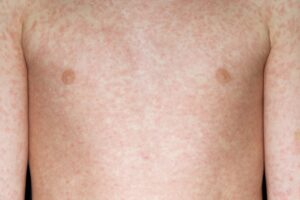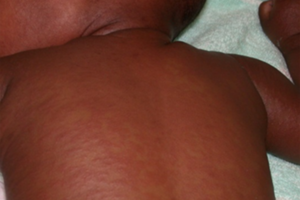Measles is a highly contagious viral infection that can cause serious complications, particularly in young children. With numbers of measles cases rising across the country, it is important for all parents and carers to know what to do if you suspect your child has it.
What is measles?
Measles is a virus that is easily spread through respiratory droplets when an infected person coughs or sneezes. The virus can survive in the air and on surfaces for several hours, making it highly contagious. Symptoms typically appear around 10 to 14 days after exposure and include:
- High fever
- Runny nose
- Cough
- Red, watery eyes (conjunctivitis)
- A rash that usually starts on the face and spreads to the rest of the body. The rash looks brown or red on white skin. It may be harder to see on brown and black skin.


The measles vaccine is the most effective way to prevent infection. The measles, mumps, and rubella (MMR) vaccine is routinely given to children in two doses, with the first dose usually administered at 12 to 15 months of age and the second dose at 4 to 6 years of age. If your child has not yet received both doses of the MMR vaccine, I strongly encourage you to speak with your GP or practice nurse about getting them vaccinated.
Find out more about why vaccinations are important and the safest way to protect yourself
What to do if you suspect measles
If you suspect your child may have measles, it’s important to seek medical advice promptly. Although rare, measles can lead to complications such as pneumonia, encephalitis (swelling of the brain), and in very rare cases, death.
Call your GP or NHS 111 first rather than taking your child into the surgery. They will provide advice on what steps to take next.
Supporting your child
While there is no specific treatment for measles, you can help reduce your child’s symptoms by ensuring they get plenty of rest, staying hydrated – and providing fever-reducing medications if necessary. Keep them comfortable and monitor for any signs of complications.
Measles can be a serious illness, but vaccination is key to preventing its spread. By staying informed and ensuring your child is up to date on their vaccinations, you’re taking an important step in protecting their health and the health of others in the community.
If you have any questions or concerns about measles or vaccination, please don’t hesitate to reach out to your GP, community pharmacist or health visitor team.